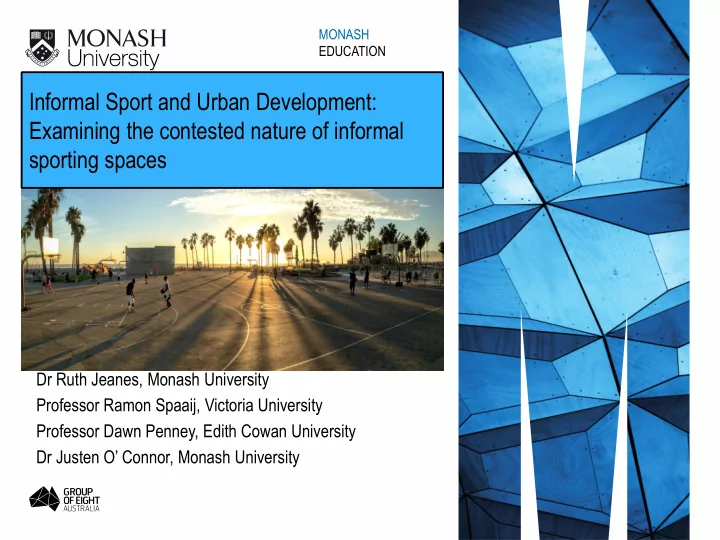

MONASH EDUCATION Informal Sport and Urban Development: Examining the contested nature of informal sporting spaces Dr Ruth Jeanes, Monash University Professor Ramon Spaaij, Victoria University Professor Dawn Penney, Edith Cowan University Dr Justen O’ Connor, Monash University
Introduction & Context Significant changes in sport participation trends (ABS, 2014) Previous decade dropped in organised participation Rise in unstructured informal participation General lack of response from policy makers and practitioners (CSIRO, 2013) • Highlighted health and social benefits (Gilchrist & Wheaton, 2017; King & Church, 2015) • More recent focus on issues of governance (Sterchele & Ferrero-Camoletto, 2017) • Regulation of Parkour (Gilchrist & Osborn, 2017; Wheaton & O’Loughlin, 2017), development of coach education • ‘Selling out’ of informal values • Issues of contested space (Gilchrist & Osborn, 2017) MONASH EDUCATION 2
Theoretical concepts Lefebvre (1991) production of space Spatial practice, representations of space, spaces of representation Space as concrete and metaphorical MONASH EDUCATION 3
Methodology Interviews with sporting and community stakeholders State Sport Association representatives (4) Local Authority Sport Development officers (7) Community group representatives (5) Various interactions with informal sport In-depth semi structured interviews, Observations of informal participation MONASH EDUCATION 4
Spatial Practices: The planning of informal sporting spaces ‘There’s just no discussion or communication. Why are we only building facilities that we want sports clubs to use when we’ve got a small percentage of the population playing structured sport and the rest aren’t? ’ (Narresh, LGA officer) MONASH EDUCATION 5
Representations of space • Tensions emerged due to histories and ideologies of how the space should be used. • Public facilities but structured clubs saw that they ‘owned’ the space • Reinforced by council attitudes towards informal groups • Would forcibly remove some groups • Racialised tensions, perceived diverse young people don’t belong in the spaces MONASH EDUCATION 6
Ownership of space ‘yes a club will have a problem with thirty Sudanese lads using “their” pitch regardless of whether they cause any damage because they don’t think they should be there’. ( Narresh, LGA officer) ‘there is so much informal participation but we are not here to support that, our role is to ensure we support those clubs that are paying membership fees and part of the system and pathway. We exist to support them so we have to make sure they are our priority focus.’ (Robyn SSA officer) MONASH EDUCATION 7
Discussion & Conclusions • Informal participation considerable growth area • Disrupting notions of what sporting space is • Creating considerable tension in communities • Value of critical spatial analysis • Need for further research that illustrates, scope, scale and experiences of informal participation MONASH EDUCATION 8
Recommend
More recommend